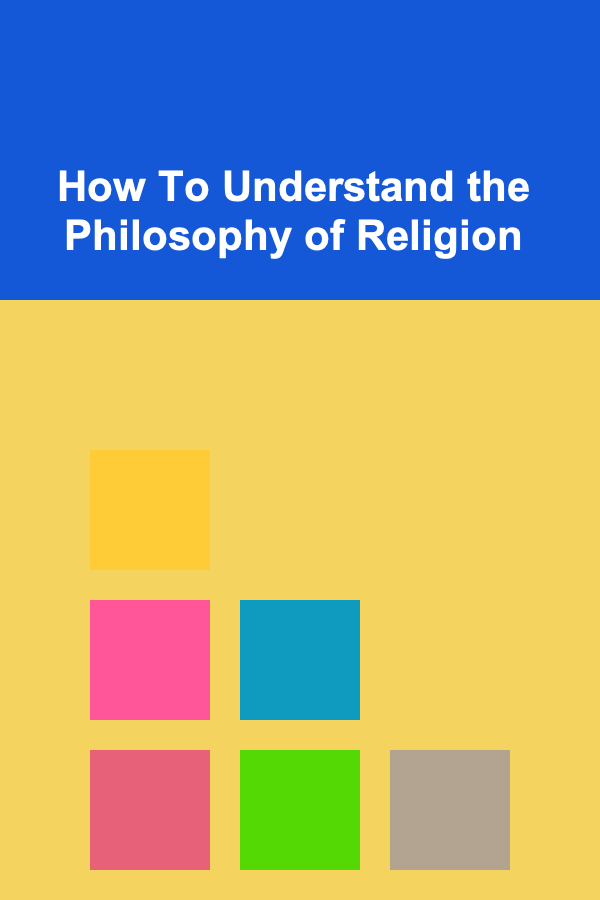
How To Understand the Philosophy of Religion
ebook include PDF & Audio bundle (Micro Guide)
$12.99$7.99
Limited Time Offer! Order within the next:

Understanding the philosophy of religion requires a deep exploration into the fundamental questions concerning the nature of religion, the existence of God, and the relationship between religion and human experience. This branch of philosophy involves the critical analysis and rational discussion of topics such as the existence of a divine being, the nature of religious experience, the interplay between reason and faith, and the ethical implications of religious teachings. As a dynamic and intellectually rich field, the philosophy of religion challenges both believers and skeptics to critically assess religious claims, offering a space for profound reflection on existential matters.
The Role of Philosophy in Religion
Philosophy, in its broadest sense, is the love of wisdom. It is a discipline that examines the nature of reality, knowledge, existence, ethics, and logic. Philosophy of religion applies these tools to religious questions, seeking to understand, interpret, and assess religious phenomena through the lens of reason.
Religious beliefs are often rooted in metaphysical, ethical, and existential claims about the world and human life. Philosophy of religion seeks to analyze these claims critically and systematically. The intersection between philosophy and religion has led to numerous debates regarding the nature of divinity, the problem of evil, the role of faith, and the place of religion in the modern world. Philosophy of religion is not confined to any one religion; rather, it explores a broad spectrum of religious traditions, from monotheism to polytheism, pantheism to atheism, and beyond.
Key Questions in the Philosophy of Religion
The philosophy of religion is deeply concerned with several core questions. These questions often challenge the basic assumptions and propositions within religious traditions and provide a foundation for critical examination. Some of the central topics include:
1. The Existence of God
One of the most significant philosophical questions in religion is whether or not God exists. Arguments for and against the existence of God are numerous, and they span different religious traditions, from classical theism to deism, pantheism, and atheism. Philosophers have put forth various arguments for the existence of God, including:
- The Cosmological Argument: This argument posits that there must be a first cause or an uncaused cause that set the universe into motion. The most famous version of this argument is found in the works of Thomas Aquinas, who argued that the existence of the universe requires a necessary being that is not contingent on anything else for its existence.
- The Teleological Argument: Also known as the argument from design, this posits that the universe's order and complexity suggest the existence of an intelligent designer. William Paley's famous analogy of the watchmaker is a classic example of this argument.
- The Ontological Argument: This argument, first proposed by Anselm of Canterbury, suggests that the very concept of God as the greatest conceivable being implies His existence. According to this argument, it is contradictory to conceive of God as the greatest being if He does not exist.
- The Moral Argument: This argues that moral laws or values presuppose a moral lawgiver, which many philosophers identify with God. Figures like Immanuel Kant and C.S. Lewis have put forth versions of this argument.
Opponents of theism, particularly atheists and agnostics, have countered these arguments. Prominent objections include the problem of evil (why a good, omnipotent God allows suffering), the argument from naturalism (that natural explanations suffice to explain the universe), and the logical problem of evil, which claims that the existence of suffering is logically incompatible with the existence of an all-good, all-powerful God.
2. The Nature of Religious Experience
Religious experience is often cited as a central element in many religious traditions. The philosophy of religion asks whether religious experiences can be considered reliable sources of knowledge about the divine. Are these experiences subjective, or do they point to something objective? Do they provide genuine insights into a higher reality, or are they simply psychological phenomena?
Some philosophers argue that religious experiences are deeply meaningful and provide direct encounters with the divine. Figures like William James, in his work The Varieties of Religious Experience, explored how personal, subjective experiences of the divine play a crucial role in shaping individual belief systems.
Other philosophers, such as David Hume, are more skeptical. Hume argues that religious experiences are often influenced by cultural and psychological factors, and therefore cannot be considered reliable evidence for the existence of God or the supernatural. He suggests that our understanding of the world should be based on empirical evidence, not personal revelations or mystical experiences.
3. Faith and Reason
The relationship between faith and reason has been a subject of intense debate in the philosophy of religion. Many religious traditions hold that faith is a fundamental aspect of belief in the divine. However, the question arises: can faith be rational? Should religious beliefs be based on evidence, or are they inherently irrational?
In Western philosophy, thinkers like Thomas Aquinas have attempted to reconcile faith and reason, suggesting that faith and reason can complement one another. Aquinas argued that reason can lead us to certain truths about God (such as His existence), but faith is required to fully comprehend the divine mysteries, such as the nature of the Trinity.
On the other hand, some philosophers, like Blaise Pascal, argued that reason can only take us so far and that the leap to faith is a necessary component of religious belief. Pascal's famous wager posits that it is better to believe in God, even in the absence of evidence, because the potential benefits far outweigh the risks of disbelief.
However, skeptics such as Søren Kierkegaard have emphasized the importance of subjective faith, pointing out that true religious belief often requires a leap beyond reason. For Kierkegaard, faith is a deeply personal and passionate commitment, not something that can be settled through rational arguments.
4. The Problem of Evil
One of the most enduring challenges in the philosophy of religion is the problem of evil. The argument goes like this: if God is all-good and all-powerful, then why is there evil and suffering in the world? This problem has been discussed by philosophers for centuries and remains one of the most significant challenges to theistic belief.
There are several responses to the problem of evil:
- Free Will Defense: One of the most common responses is that evil exists because of human free will. God, being good, created human beings with the ability to choose between good and evil. Evil arises as a consequence of humanity's misuse of this freedom.
- Soul-Making Theodicy: Another response, proposed by John Hick, argues that evil and suffering serve a greater purpose in the development of human souls. According to this view, suffering provides opportunities for moral growth, which would not be possible in a world without challenges.
- The Greater Good Defense: This argument suggests that God allows evil to exist because it leads to a greater good. The existence of evil, while tragic, may be part of a divine plan that ultimately leads to greater moral, spiritual, or existential fulfillment.
Critics of these theodicies argue that the sheer scale of evil and suffering in the world, including natural disasters and diseases, challenges the coherence of the traditional theistic concept of God.
5. The Afterlife and Ethics
The philosophy of religion also delves into questions about the afterlife and the ethical teachings of religion. Do religious traditions offer a coherent account of what happens after death? Is there a moral order to the universe, and does religion provide an adequate framework for understanding human ethics?
Religious traditions often present visions of the afterlife that shape ethical behavior in the present. For example, many Christian and Islamic traditions hold that one's actions in this life determine their fate in the afterlife, whether in Heaven, Hell, or some form of eternal judgment. These beliefs can serve as moral guides for adherents, as they are often framed within a larger cosmic order governed by divine justice.
Philosophers of religion, such as William Lane Craig, argue that the afterlife provides a necessary framework for understanding the moral order of the universe. Without some form of ultimate justice, Craig contends, the problem of evil cannot be fully resolved.
On the other hand, secular philosophers, including existentialists like Jean-Paul Sartre, argue that morality can be grounded in human autonomy and reason rather than divine command. According to this view, the search for meaning and ethics is a human endeavor, not necessarily one dependent on religious or metaphysical systems.
Conclusion
The philosophy of religion is a complex, multifaceted field that addresses some of the most profound and fundamental questions about human existence. By analyzing the nature of God, religious experience, the relationship between faith and reason, the problem of evil, and ethical teachings, philosophy of religion offers a critical and rational framework for understanding religious belief systems. It invites individuals to engage with religious ideas in a deep, thoughtful, and intellectually rigorous manner.
For those who are deeply committed to religious traditions, philosophy of religion can help clarify and strengthen their beliefs, while for skeptics, it provides an avenue for exploring and questioning religious claims. Ultimately, the philosophy of religion is a dynamic and essential discipline that continues to evolve as it responds to the changing landscape of human experience, culture, and intellectual inquiry. Whether one is a devout believer or a curious skeptic, engaging with the philosophy of religion provides valuable insights into the mysteries of life, death, and the divine.

Cutting Down on Wedding Guest Expenses: Tips for Enjoying the Big Day Without Breaking the Bank
Read More
Effective Strategies for Minimizing Credit Card Debt and Regaining Financial Freedom
Read More
How to Develop a Marketing Strategy for Your Small Business
Read More
Top Thrifty Holiday Decorations Ideas for a Festive and Affordable Celebration
Read More
What Are the Benefits of Minimalism in Home Organization?
Read More
How to Track Investment Fees Across Multiple Brokerages
Read MoreOther Products

Cutting Down on Wedding Guest Expenses: Tips for Enjoying the Big Day Without Breaking the Bank
Read More
Effective Strategies for Minimizing Credit Card Debt and Regaining Financial Freedom
Read More
How to Develop a Marketing Strategy for Your Small Business
Read More
Top Thrifty Holiday Decorations Ideas for a Festive and Affordable Celebration
Read More
What Are the Benefits of Minimalism in Home Organization?
Read More